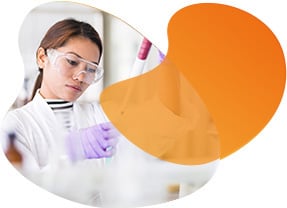Originally published : Wed, April 8, 2020 @ 9:22 PM
Updated : Wed, November 25, 2020 @ 8:23 PM
 On March 25, 2020, the US Food and Drug Administration (FDA) held the first of a series of virtual town halls they will be holding to answer technical questions about developing, validating, and implementing tests to detect SARS-CoV-2. Elizabeth Hillebrenner and Timothy Stenzel, PhD, from the Center for Devices and Radiological Health (CDRH) provided an overview of the policies governing the development and deployment of SARS-CoV-2 tests as well as expanded guidance on the existing policies. One of the more interesting points they covered were the different scenarios where diagnostic test developers do not need to file for an emergency use authorisation (EUA), which the FDA put in place to expedite increased testing capabilities. We’ve summarised those scenarios here, although we recommend you use the links at the end of this post to see the source material from the FDA if you are considering any of these pathways.*
On March 25, 2020, the US Food and Drug Administration (FDA) held the first of a series of virtual town halls they will be holding to answer technical questions about developing, validating, and implementing tests to detect SARS-CoV-2. Elizabeth Hillebrenner and Timothy Stenzel, PhD, from the Center for Devices and Radiological Health (CDRH) provided an overview of the policies governing the development and deployment of SARS-CoV-2 tests as well as expanded guidance on the existing policies. One of the more interesting points they covered were the different scenarios where diagnostic test developers do not need to file for an emergency use authorisation (EUA), which the FDA put in place to expedite increased testing capabilities. We’ve summarised those scenarios here, although we recommend you use the links at the end of this post to see the source material from the FDA if you are considering any of these pathways.*
Scenario 1: State authorisation of high complexity CLIA labs
This scenario is covered under Section B of the FDA guidance issued on March 16, 2020, and it gives states and territories the authority to approve SARS-CoV-2 tests developed and performed by high complexity CLIA labs within their jurisdiction. Under this policy, the FDA is letting each state or territory design their own approval process without either the state or the lab needing to obtain an EUA. The only federal requirement is that any states wishing to provide their own approvals need to notify the FDA, and labs that are testing patients under this policy are recommended but not required to notify the FDA.
The list of states which have notified the FDA that they will be authorising SARS-CoV-2 tests under Section B of the March 16, 2020 guidance can be found on the FDA’s SARS-CoV-2 diagnostic testing FAQ page. As of April 7, 2020, this list includes:
- State of Connecticut
- State of Maryland
- State of Mississippi
- State of Nevada
- State of New York Department of Health Wadsworth Center
- Washington State Department of Health
Scenario 2: Modifications to an EUA test that are validated by bridging studies
Another time-saving option for testing labs is the ability to use a modified EUA test without needing to submit a new EUA request. Under this scenario, a high-complexity CLIA lab can make changes to an already authorised test, whether it’s by using a different instrument or test component, and provide an appropriate bridging study has been performed, that lab can use the test without needing a new EUA. The bridging studies do not need to be completed by the lab using the modified protocol as long as another lab has demonstrated equivalence. However, significant changes to the workflow involving multiple components should be done in consultation with the FDA. This acceptance also of course, does not extend to commercial diagnostic kit developers, who will be required to submit a modified EUA and its bridging validation study.
As an example, for high complexity CLIA labs already using our CDC-qualified Probe and Primer Kits for SARS-CoV-2 with the CDC protocol, you can also use our RapiDxFire qPCR 5x Master Mix, EpiScript™ RNase H- Reverse Transcriptase, or IntelliQube™ Fully Automated PCR System under the current EUA, although it is still the clinical lab's responsibility to perform bridging studies where appropriate and determine whether changes are significant enough to require FDA consultation.
While the FDA is not requiring formal notification, they are requesting that they receive all bridging study data via email and, if permitted by the sender, they will post the bridging data to their FAQ page so that other labs do not need to repeat the study.
Where to get more information

The global COVID-19 pandemic is affecting everyone, which makes this mission critical project a personal one for the team at LGC, Biosearch Technologies. It’s all of our lives and our loved one’s lives that are at stake, and we are committed to ensuring that our enabling technologies are reaching the labs and diagnostic kit manufacturers as quickly as possible. As part of this effort, we’ve been attending the FDA’s webinars and, now, their virtual town halls, and sharing what we’ve learned. Here are links to more information from the FDA:
- The slides from the March 25, virtual town hall
- The transcript of the virtual town hall
- A recording of the virual town hall
- The FAQ on diagnostic testing for SARS-CoV-2
To support testing labs and diagnostic kit manufacturers, we’ve assembled probe and primer kits for SARS-CoV-2 testing that have been qualified by the US Centers for Disease Control (CDC). Each lot of the probe and primer set is released for distribution by CDC testing results and includes FAM-BHQ probes and primers mixed into a single assay per signature as required by the CDC’s protocols.
We can also meet other SARS-CoV-2 testing needs with a range of products and services. You can learn more here.
*Since the original publication of this blog, the US Department of Health and Human Services have formally instructed the Food and Drug Administration to review voluntary Emergency Use Authorisation submissions of SARS-CoV-2 lab-developed tests, which reverses a previous FDA decision to stop reviewing EUA submissions for SARS-CoV-2 LDTS. To read more on the decision click here.



